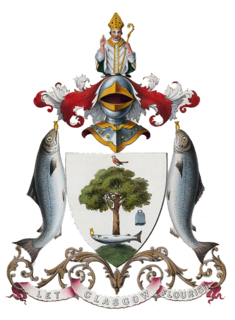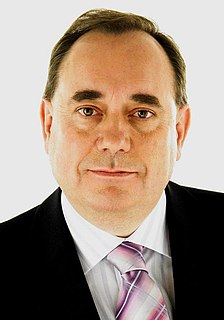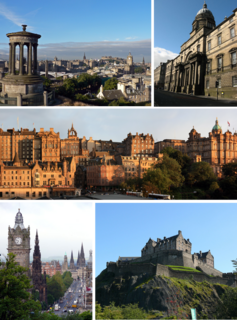
Glasgow City Council, the local government body of the city of Glasgow, Scotland, became one of the newly created single tier local authorities in 1996, under the Local Government etc. (Scotland) Act 1994, with boundaries somewhat different from those of the City of Glasgow district of the Strathclyde region: parts of the Cambuslang and Halfway and Rutherglen and Fernhill areas were transferred from the city area to the new South Lanarkshire council area.
The Politics of Aberdeen, Scotland have changed significantly in recent years. In 1996, under the Local Government etc. (Scotland) Act 1994, Grampian Regional Council and Aberdeen District Council were dissolved, creating the new unitary Aberdeen City Council to represent the city's council area.

The 2011 Scottish Parliament election was held on Thursday, 5 May 2011 to elect 129 members to the Scottish Parliament.

There were elections for the Scottish district councils in 1977.

The 2012 Scottish local elections, were held on 3 May, in all 32 local authorities. The Scottish National Party (SNP) overtook Labour to win the highest share of the vote, and retained and strengthened its position as the party with most councillors. Labour also made gains, while the Liberal Democrats experienced meltdown, falling behind the Conservatives. For the first time since the introduction of the Single Transferable Vote system, the SNP won majority control of 2 councils, from no overall control. Labour also won majority control of 2 councils from no overall control, while retaining majority control over 2 councils.
The 2011 council elections in Guildford saw the Conservatives retain control over Guildford Borough Council with an increased majority of 20 seats. Full results for each ward can be found at Guildford Council election, full results, 2011.

There were elections for the Scottish district councils in 1980.

Elections to Glasgow City Council were held on 3 May 2012, the same day as the other Scottish local government elections. The election was the second using 21 new wards created as a results of the Local Governance (Scotland) Act 2004, each ward elected three or four councillors using the single transferable vote system a form of proportional representation.

Elections to East Lothian Council were held on 3 May 2012, on the same day as the other Scottish local government elections. The election used the 7 wards created as a result of the Local Governance (Scotland) Act 2004, with each ward electing three or four councillors using the single transferable vote system a form of proportional representation, with 23 councillors elected.

The 2017 Scottish local elections were held on Thursday 4 May, in all 32 local authorities. The SNP retained its position as the largest party in terms of votes and councillors, despite suffering minor losses. The Conservatives made gains and displaced Labour as the second largest party, while the Liberal Democrats suffered a net loss of councillors despite increasing their share of the vote. Minor parties and independents polled well; and independent councillors retained majority control over the 3 island councils. For the first time since the local government reforms in 1995, all councils fell under no overall control.

An Election to the Edinburgh Corporation was held on 6 May 1969, alongside municipal elections across Scotland. Of the councils 68 seats, 23 were up for election.
Scottish local elections were held in 1967 to elect members to the various Corporations, Burghs, and County Boards of Scotland.

An Election to the Edinburgh Corporation was held on 2 May 1972, alongside municipal elections across Scotland. Of the councils 69 seats, 23 were up for election.

An Election to the Edinburgh Corporation was held on 1 May 1973, alongside municipal elections across Scotland. Of the councils 69 seats, 26 were up for election. Labour, despite needing only 1 gain to take control of the council, failed to do so, preventing them from a historic win.
An Election to Glasgow City Council was held on 6 May 1969, alongside municipal elections across Scotland. Of the councils 111 seats, 37 were up for election. The election saw Labour losing its majority, with the council being gained by a Progressive-Conservative alliance, who emerged from the election with a total of 57 of the council's 111 seats.

The Glasgow City Council election of 2017 was held on 4 May 2017, the same day as the 31 other Scottish local government elections. The election was the first to use 23 new wards, created as a result of the Local Government Boundary Commission for Scotland's 5th Review. Each ward elected three or four councillors using the single transferable vote system, a form of proportional representation used since the 2007 election and according to the Local Governance (Scotland) Act 2004.
Elections to East Lothian Council will be held on 4 May 2017 on the same day as the other Scottish local government elections. The election will consist of 6 wards electing three or four Councillors using the single transferable vote system a form of proportional representation, with 22 Councillors elected.
Elections to East Dunbartonshire Council were held on Thursday 4 May, the same day as the 31 other local authorities in Scotland. The election used seven wards created under the Local Governance (Scotland) Act 2004, a reduction of one from 2012, with 22 Councillors being elected, 2 fewer overall. Each ward elected either 3 or 4 members, using the STV electoral system.

Elections to Stirling Council were held on 4 May 2017, the same day as the 31 other local authorities in Scotland. The election used the seven wards created under the Local Governance (Scotland) Act 2004, with 23 councillors being elected, an increase of 1 from 2012. Each ward elected either 3 or 4 members, using the STV electoral system. Following the Fifth Electoral Review by the Local Government Boundary Commission for Scotland, minor changes were made to several of the ward boundaries and one additional Councillor was added moving the total number of Councillors from twenty-two to twenty-three.
Elections to North Lanarkshire Council were held on Thursday 4 May 2017, on the same day as the 31 other local authorities in Scotland. The election utilised the twenty-one wards created under the Local Governance (Scotland) Act 2004, with 77 Councillors being elected. This represented an increase of 7 seats and 1 additional ward when compared to 2012. Each ward elected either 3 or 4 members, using the STV electoral system.













